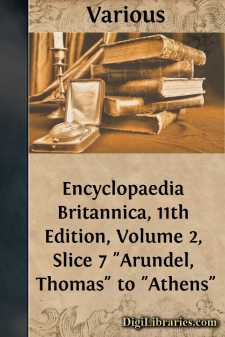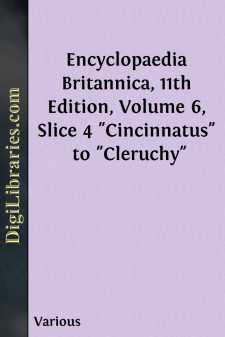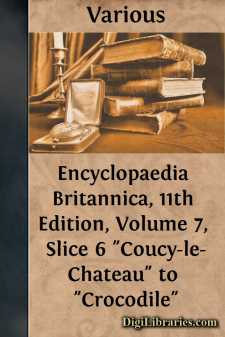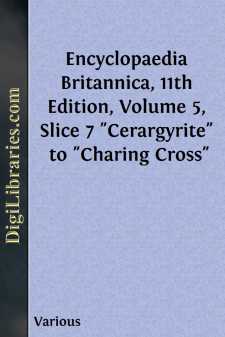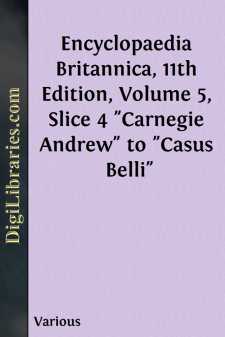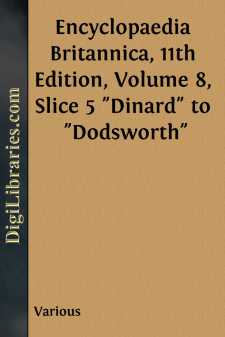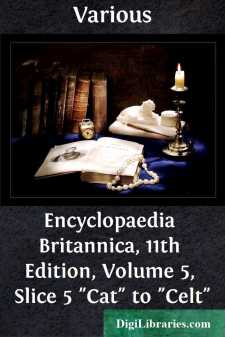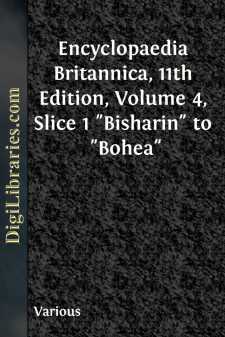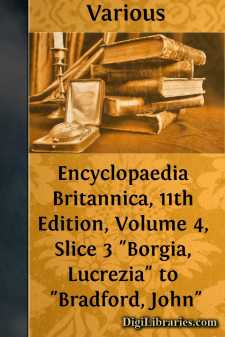Reference
- Atlases 1
- Bibliographies & Indexes 10
- Catalogs 55
- Dictionaries 1
- Encyclopedias
- Etiquette 14
- Handbooks & Manuals 19
- Heraldry 2
- Quotations 9
Encyclopedias Books
Sort by:
by:
Various
ARUNDEL, THOMAS (1353-1414), archbishop of Canterbury, was the third son of Richard Fitzalan, earl of Arundel and Warenne, by his second wife, Eleanor, daughter of Henry Plantagenet, earl of Lancaster. His family was an old and influential one, and when Thomas entered the church his preferment was rapid. In 1373 he became archdeacon of Taunton, and in April 1374 was consecrated bishop of Ely. During...
more...
by:
Various
CINCINNATUS,LUCIUS QUINCTIUS, (b. c. 519B.C.), one of the heroes of early Rome, a model of old Roman virtue and simplicity. A persistent opponent of the plebeians, he resisted the proposal of Terentilius Arsa (or Harsa) to draw up a code of written laws applicable equally to patricians and plebeians. He was in humble circumstances, and lived and worked on his own small farm. The story that he became...
more...
by:
Various
COUCY-LE-CHÂTEAU, a village of northern France, in the department of Aisne, 18 m. W.S.W. of Laon on a branch of the Northern railway. Pop. (1906) 663. It has extensive remains of fortifications of the 13th century, the most remarkable feature of which is the Porte de Laon, a gateway flanked by massive towers and surmounted by a fine apartment. Coucy also has a church of the 15th century, preserving a...
more...
by:
Various
CERARGYRITE, a mineral species consisting of silver chloride; an important ore of silver. The name cerargyrite is a Greek form (from κÃρας, horn, and á¼âργυρος, silver) of the older name hornsilver, which was used by K. Gesner as far back as 1565. The chloro-bromide and bromide of silver were also included under this term until they were distinguished chemically in 1841 and...
more...
by:
Various
CARNEGIE, ANDREW (1837- ), American “captain of industry” and benefactor, was born in humble circumstances in Dunfermline, Scotland, on the 25th of November 1837. In 1848 his father, who had been a Chartist, emigrated to America, settling in Allegheny City, Pennsylvania. The raw Scots lad started work at an early age as a bobbin-boy in a cotton factory, and a few years later was engaged as a...
more...
by:
Various
DINARD, a seaside town of north-western France, in the department of Ille-et-Vilaine. The town, which is the chief watering-place of Brittany, is situated on a rocky promontory at the mouth of the Rance opposite St Malo, which is about 1 m. distant. It is a favourite resort of English and Americans as well as of the French, its attractions being the beauty of its situation, the mildness of the climate...
more...
by:
Various
CAT,properly the name of the well-known domesticated feline animal usually termed by naturalistsFelis domestica, but in a wider sense employed to denote all the more typical members of the familyFelidae. According to theNew English Dictionary, although the origin of the word “cat” is unknown, yet the name is found in various languages as far back as they can be traced. In old Western Germanic it...
more...
by:
Various
DEMIJOHN, a glass bottle or jar with a large round body and narrow neck, encased in wicker-work and provided with handles. The word is also used of an erthenware jar, similarly covered with wicker. The capacity of a demijohn varies from two to twelve gallons, but the common size contains five gallons. According to the New English Dictionary the word is an adaptation of a French Dame Jeanne, or Dame...
more...
by:
Various
BISHÂRÎN (the anc. Ichthyophagi), a nomad tribe of African “Arabs,” of Hamitic origin, dwelling in the eastern part of the Nubian desert. In the middle ages they were known as Beja (q.v.), and they are the most characteristic of the Nubian “Arabs.” With the Abâbda and Hadendoa they represent the Blemmyes of classical writers. Linguistically and geographically the Bishârîn form a connecting...
more...
by:
Various
BORGIA, LUCREZIA(1480-1519), duchess of Ferrara, daughter of Cardinal Rodrigo Borgia, afterwards Pope Alexander VI. (q.v.), by his mistress Vanozza dei Cattanei, was born at Rome in 1480. Her early years were spent at her mother’s house near her father’s splendid palace; but later she was given over to the care of Adriana de Mila, a relation of Cardinal Borgia and mother-in-law of Giulia Farnese,...
more...


